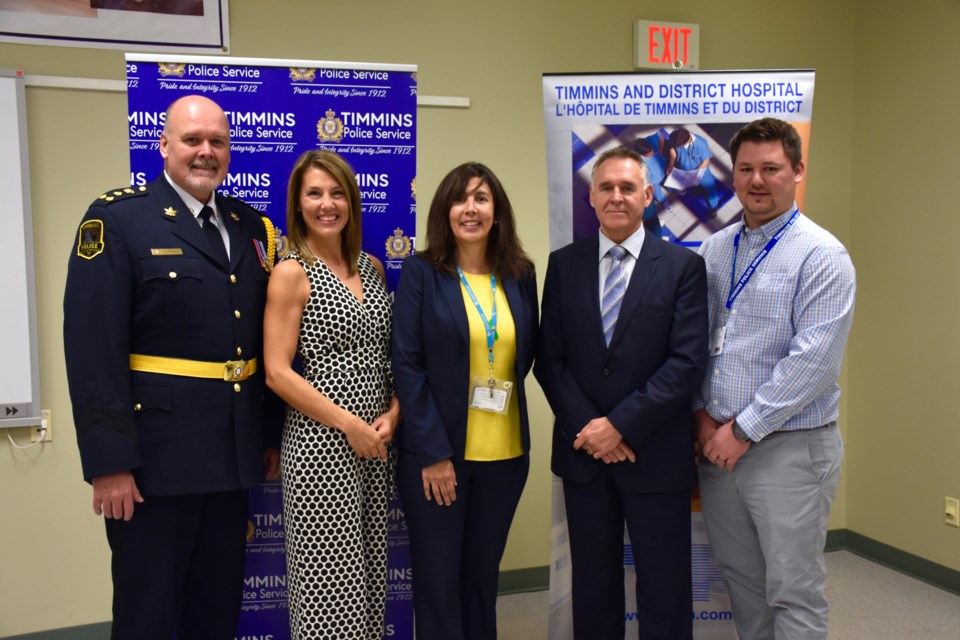Timmins Police officers and mental health workers are teaming up for a new initiative.
The Mobile Crisis Rapid Response Team officially hits the streets this Friday. It will be available daily from 11 a.m. to 11 p.m.
The initiative is a partnership between the Timmins Police Service and Timmins and District Hospital.
Two Timmins Police officers and three mental health staff (a registered nurse and social workers) from the hospital will be paired up and responding to calls.
“Basically initially it’s going to work from a deployment approach where dispatch will deploy us to all the crisis calls that come in to the service," explained Const. Mike Tambeau, who is one of the officers on the new team.
The types of calls include suicide attempts or threats of suicide, overdose-related calls, mental health calls, patients with Alzheimers or dementia, children having difficulty coping with certain things, well-being checks, and mental health act calls.
He said a primary response officer will also attend with the crisis team.
Once the scene is safe, the primary response officer will leave and the crisis team will take it from there.
"The beauty of the Mobile Crisis Rapid Response Team is the fact that the crisis worker that is normally in emerg when we do an apprehension is now at the scene, whether it be in a residence or in the community, starting an assessment immediately," he said.
Tambeau said when officers respond to crisis calls right now, the officer is limited to an apprehension, at which point they would be brought to a crisis worker at the hospital. If there's no grounds for that, the person would remain in the community once the situation is de-escalated.
"Now we can do that de-escalation, we can do an assessment on scene, if there’s no apprehension we can do some outreach with them, we can do some safety planning, help them get to the resources that they need in the community," he said.
"The following day or within a few days, we can go back and visit these people and see whether or not they’re following up on the safety plan that was devised by the crisis worker."
Timmins and District Hospital mental health unit clinical educator Brigitte Potvin said the initiative means clients will be receiving care where, and when, they need it.
Through the hospital crisis line, she said they hear from patients who are afraid to talk because they don't want someone to get them and take them to hospital.
"Mental health is shown to be really beneficial if the individuals are in their own community or even in their own homes to receive care. The unit itself is an acute unit, so we stabilize, send them home and we continue the recuperation in the community. This way here, we’re actually doing it right from the start,” she said.
For officers, she noted there won't be the long wait at the hospital for having a crisis assessment done in a clinical setting.
"They’ll be in the community with the patients, in their homes or environment and I think it’s going to save time for everybody,” she said.
The crisis team's creation is part of a regional and provincial mental health and justice strategy to divert people with mental health or addiction crisises away from the justice system and avoid unnecessary hospital visits.
The goal is for the team to be fully integrated with other crisis services such as safe beds, and connect people with the supports needed to address their longterm wellbeing.
"Gone are the days of simply locating persons in crisis and transporting them to the nearest mental health facilities or drug rehabilitation cenre. That approach has proven to be too simplistic, too narrow minded and in all candor, too repetitive to be effective. This new approach will better allow for specialized Timmins Police officers, working in direct collaboration with mental health professionals, to genuinely attend to the needs of persons in need of assistance," said Timmins Police Chief John Gauthier in a news release.
"This is a community partnership focused on addressing those persons afflicted with mental health and addiction issues in a progressive and proactive fashion."



